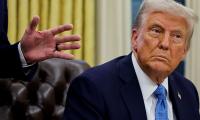ISLAMABAD: Prime Minister Imran Khan on Thursday praised the Communist Party of China (CPC) for its unique model, calling it an alternative to Western democracy.
“Until now, we had been told that the best way for societies to improve was through Western democracy. However, CPC introduced an alternative system and they have beaten all Western electoral democracies in the way they have highlighted merit in society,” he pointed out.
He said a society only succeeds when it has systems in place for holding the ruling elite accountable and ensuring meritocracy. “Until now, the feeling was that electoral democracy is the best way to bring leaders on merit and hold them accountable.
“But the CPC has achieved much better without democracy. Their system for sifting through talent and bringing it up is better than the democratic system.” He said China waged a better and successful war against corruption.
Premier Imran was appreciative of the flexibility of the system and said, “In our society and in Western democracies, it is difficult to bring a change as you are bound by rules and regulations and democracies only plan for the next five years”. He continued that leaders like Chinese President Xi Jinping worked their way up from the bottom and added that one could only become a leader after going through a long struggle. This process is not present in the Western democracies. An American president does not go through this rigorous process. He noted that when leaders like Xi reach the top, they are able to completely understand the system, a trait that is unique to China.
About the Pak-China relations, he said, “Whenever Pakistan has been in trouble, politically or internationally, China has always stood with us. The people of China have a special place in the hearts of Pakistanis.
“Relations between the two countries have only gotten stronger. You see a strange great power rivalry in the region. The United States is wary of China and has formed a regional alliance called the Quad.
“We think that it is unfair of the US and Western powers to expect countries like Pakistan to take sides. Pakistan will not downgrade its relations with China”. Calling US’s China policy inexplicable and worrying, PM Imran Khan said it would divide the world in two groups, which would be dangerous for the entire world nations.
The PM made it clear that no matter how much pressure, there would be no change in strong Pakistan-China relations, while the US hoped of taking sides, which was not proper. He said that the idea that India was supposed to act as a counterbalance to China would be detrimental for the former, for China is too strong. India would reap far greater benefits by engaging in trade with China rather than trying to act as a counterbalance. If anyone is going to lose out, it would be India, he added.
Premier Imran also explained that Pakistan's relationship with China had nothing to do with India, saying, “our relationship is a bilateral relationship. It is extremely strong”. The premier said that Pakistan accepted China's version regarding its programmes in Xinjiang province, as their very strong relations were based on trust. However, at the same time, he termed it a little hypocritical that in the Western media, there was hardly coverage of much worse human rights issues in (Indian Illegally Occupied Jammu and) Kashmir, while we hear about Xinjiang and Hong Kong, which is a bit hypocritical.
In an interaction with Chinese media, both formal and through video link, Premier Imran was asked for his comment on the Xinjiang province and he remarked, “our interaction with Chinese officials… that version of what is happening in Xinjiang is completely different from the version of Western media and Western governments.
“So because we have a very strong relationship with China, based on trust, so we actually accept the Chinese version… what they say about their programmes in Xinjiang.” He continued that Pakistan found it a little bit hypocritical that when there are much more worse human rights issues in the world, which get no attention. For instance, [Indian occupied] Kashmir is a huge human right problem and there are about 8-9 million Kashmiris put into an open prison [by India] until recently. It is a police state, where there are extrajudicial killings; there is imprisonment, there are arbitrary arrests and a ban on the media and yet there is hardly any adverse comment in the Western media. Hundreds of thousand Kashmiris have been killed in last 30 years in the freedom struggle; it is disputed territory, yet you hardly get any coverage in Western media and we hear about Xinjiang and Hong Kong, which is a bit hypocritical.
About the situation in Afghanistan, the PM said that unfortunately no one had the answer right now and added that the US was trying to find a military solution in Afghanistan, which was its biggest mistake: They kept doing the same thing over and over and over again, and thought they would get a different result. He explained that historically, the people of Afghanistan had been resistant to being dictated from the outside. “You can invade Afghanistan, but once you are there, it is a very difficult country to control,” he added.
Prime Minister Imran said the Afghan war had gone on too long and created deep divisions in Afghan society and added that the moment the Americans decided there was no military solution in Afghanistan, they gave a date for the exit and the Taliban considered that a victory. “Now when they think they have won the war; it is very difficult from Pakistan’s point of view to make them reach a political settlement,” he said. He added Pakistan was worried about the possibility of a civil war in Afghanistan. In such a scenario, Pakistan will suffer the most after Afghanistan.
He said that Pakistan could learn a lot from China when it comes to agriculture. He noted that China's agricultural productivity is much higher, and “I hope that we can benefit from the latest techniques and technology”. He said that despite what the world may think of China due to its economic dominance, it admired President Xi.
“The way China dealt with the Covid-19 pandemic was unique ... considering that it started there. When you look at the rest of the world, China stands out. Islamabad is grateful to Beijing for the help extended during the fight against the coronavirus,” he added.
The PM, at the start of his interaction, congratulated the Chinese president and the Communist Party. “In Pakistan, we admire the Chinese president for two reasons: for his fight against corruption... and for bringing people out of poverty. Pakistan is committed to strengthening relations with China whether it is politically or economically. The China-Pakistan Economic Corridor (CPEC) is a flagship project. I will be going to Gwadar next week to oversee development work over there,” he said.
He said that he was also looking forward to his trip to China which was in the offing. Commenting on the economic relationship between the two countries, the PM said that he sees this moving forward and the next phase of CPEC is very exciting for Pakistan. “We plan to attract Chinese investment for special economic zones as our labour is cheaper,” he added.
Demand was made at consultative meeting organised by Takht Bhai Press Club
Cardinal, who has always maintained his innocence, launched appeal that’s currently still under consideration
Retired Admiral also pointed out high cost of technology throughout history, from Napoleonic wars to present day
Senator Saleem Mandviwalla chaired committee meeting convened at Parliament House
Two-member bench of apex court dismissed appeal of Chief Commissioner Regional Tax Officer, Bahawalpur
Committee, chaired by Raja Khurram Shahzad Nawaz, convened at Parliament House on Wednesday







